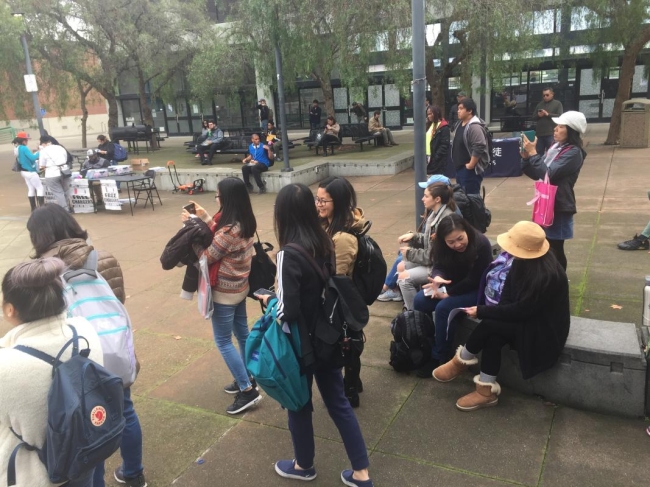You have /5 articles left.
Sign up for a free account or log in.

Students on campus at Laney College.
Peralta Community College District
Student journalists at Laney College in Oakland, Calif., are suing the Peralta Community College District for failing to adequately respond to public records requests. The plaintiffs say the district’s lagging or partial responses stymie their efforts to do investigative work and hold the district accountable. District officials say they comply with the law and do their best to handle the administrative burden of repeated requests.
The lawsuit was filed earlier this month in the County of Alameda Superior Court by four reporters and their student-run newspaper, The Citizen. The suit claims the district isn’t complying with the California Public Records Act, which guarantees access to records with “information relating to the conduct of the public’s business” from state agencies, including public colleges and universities. An institution that receives a public records request in the state generally has 10 days to determine what documents it has within the request’s purview and must “promptly” disclose the documents.
According to the lawsuit, The Citizen has six outstanding public record requests, including one made nearly two years ago, that haven’t received sufficient response from district officials.
Shiloh Johnston, editor in chief of The Citizen, said the student newspaper is the only publication solely focused on the district, and the surrounding community relies on its coverage.
“If we don’t have those records, we can’t inform our community about what’s happening in the district,” he said. “This is a public, taxpayer-funded institution … Part of the role of journalism is to hold government accountable, and we can’t do that if there isn’t transparency.”
Mark Johnson, the district’s executive director of marketing, communication and public relations, said district leaders are “disappointed” students filed the lawsuit.
“Peralta CCD staff has continuously worked with Citizen reporters to provide documents,” he said in an email. “Peralta has provided many documents in response to the numerous requests made by the Citizen. Our plan is to continue to work with The Citizen and resolve any issues that remain unaddressed.”
He said the district started using a ticketing system in late 2020 to better keep track of and answer public records requests. Each request is assigned a ticket number so it doesn’t fall through the cracks, and it is handled by the contracts and legal affairs office.
Among other examples, the lawsuit alleges that one student’s request—to see all outstanding public records requests—filed in November 2020 wasn’t answered until October 2022 after multiple follow-ups. Even then, the request received only a partial response, according to the suit.
When the district announced it would cut ties with the local sheriff’s office and opt for “community-based safety services,” another student journalist requested to see the bids from interested security contractors as well as the agenda, minutes and Zoom link for a pre-proposal meeting. She later also requested the names of committee members responsible for reviewing the security applicants. The lawsuit says the district gave over documents with “inconsistent” redactions and that students have reason to believe not all bids were included. District officials also initially claimed the Zoom meeting didn’t occur but then later produced the recording, a sign of a “haphazard” search for records, the lawsuit alleges.
Johnston, the editor, requested four years’ worth of credit card records for chancellors past and present and some other employees. The district responded that the records were in storage but hasn’t produced them nearly nine months later, according to the lawsuit.
“We’re in this weird limbo where the district has halfheartedly responded to all six of the requests” but hasn’t answered them in full, said Sam Ferguson, the attorney representing The Citizen. “Enough is enough. The students are entitled to these documents” and “promptly” by law.
Repeated public records requests that ask for wide swaths of information put a strain on district employees, Johnson, the spokesperson, said.
“Peralta always seeks to comply with its mandate under the Public Records Act,” he said. “We hope that requestors, like The Citizen, understand the tremendous burden multiple broad requests puts on the system.”
Mike Hiestand, senior legal counsel at the Student Press Law Center, an organization that defends the legal rights of student journalists, said he recognizes that public records requests to colleges “add some workloads to these folks’ lives,” so he encourages student reporters to first sit down with college staff members and ask what might be “less obtrusive” ways to get the information needed.
But “at the end of the day, these laws exist for a reason, and journalists use them for a reason,” he said.
Hiestand noted that getting access to public records is a struggle for students and professional reporters alike nationwide. The center gets so many calls about cases related to obtaining public records that it doesn’t have the bandwidth to provide legal services for all of them, so its team devised a state-by-state template to help students file these kinds of complaints.
He said college officials sometimes purposely delay responding to specific requests, figuring that the student journalists seeking the information will eventually graduate and move on, making their efforts to get the records moot. It’s a cynical waiting game that effectively denies the request for information without openly or directly denying it.
Colleges “will outlast the students in many cases, and they take advantage of that,” Hiestand said. He finds that the most “egregious” cases tend to be at community colleges, in part because of “the transitory nature of the students there.”
The Citizen, like many student newspapers, has been something of a thorn in the side of the institutions it covers. And the district has provided no shortage of stories. District leaders made controversial cuts to courses in recent years amid enrollment declines. A 2021 Alameda County civil grand jury report blasted the district’s Board of Trustees at the time for infighting and poor shared governance practices, among other issues. The Accrediting Commission for Community and Junior Colleges, the district’s accreditor, also put the district on probation in 2020 because of financial problems, and then on a lighter “warning” status last year, but after improvements ACCJC removed all sanctions this month.
Johnson, the spokesperson, said he worries the lawsuit will take the focus off of the district’s recent accomplishments.
“I’m concerned about the litigation with the student paper overshadowing a really major accomplishment, which is that the Peralta Community College District has worked so hard over the last three years to address financial concerns, concerns about governance, and really walk back from the brink of a state takeover to being reconfirmed by the accrediting commission as fully accredited,” he said.
Students say covering the district is hard work, and filing the lawsuit has been an additional time investment for them, but it’s worth it.
Student journalists are “finding time between work and school and staying up until 2 in the morning and doing everything that we can, and breaking our backs at the end of the day,” Johnston said. “It’s not easy. It’s a long and arduous process, and while this has been frustrating and the stonewalling has put undue stress on all of us, there is a sense of relief that this lawsuit has finally been filed … Hopefully it sheds a little bit more light on what’s going on.”
As he and other reporters prepare to graduate, he said the goal of the lawsuit goes beyond just getting ahold of the records students requested.
“Part of this is hopefully to set a precedent, to give this district a message that we expect more from them,” he said. “We’re temporary … but The Citizen was here before us and will be here after us. And we hope that doing this lawsuit will prevent future iterations of our newsroom from feeling the same disrespect, the same frustrations … Maybe this will ripple through other community college districts.”





